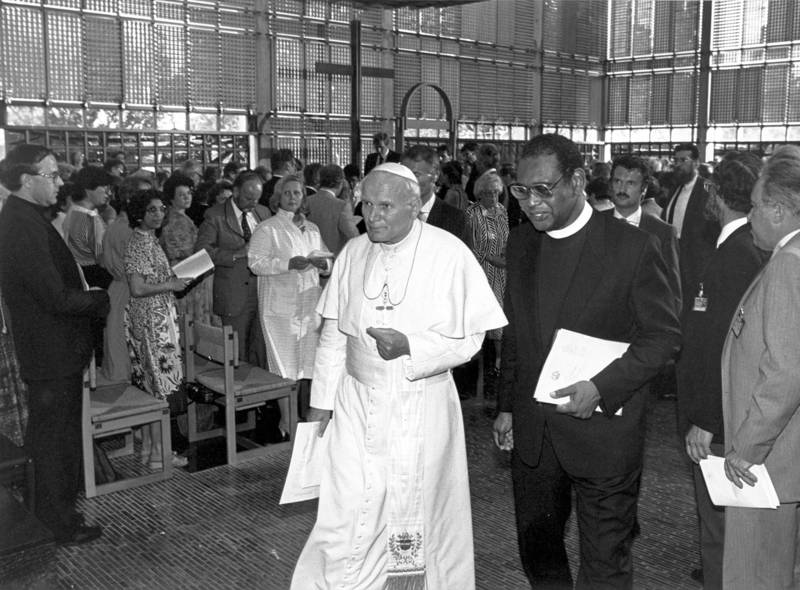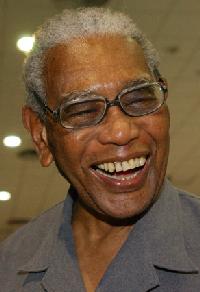Rev. Dr Philip Potter - A world icon
By THOMSON FONTAINE
Update: Reverend Philip Potter died in Germany on March 31, 2015 at the age of 96
Sunday April 10, 2011, @ 11:41 p.m.
Roseau (TDN)-The world renowned Reverend Dr Philip Alford Potter is arguably the most famous Dominican and one of only a handful of persons ever to have such a profound influence on the course of world history.

Rev Potter with Pope Paul VI. |
Growing up on the streets of Roseau in the 1920s the young Potter could never have dreamed that he would some day become one of the most recognizable names in the world as head of the World Council of Churches (WCC).
The WCC represents over 350 protestant, Methodist, Anglican and orthodox catholic churches, with over half a billion adherents worldwide and at one time was considered the most influential Christian body outside the Roman Catholic Church.
Much of the WCCs prestige and high world profile has been credited to Reverend Potter when he served as its Secretary General from 1972 – 1984. In a ceremony marking his 85th birthday in Brazil in 2006, Reverend Dr. Samuel Kobia the then Secretary General observed that “great strides were taken by the WCC under Philip Potter's leadership; among the most memorable were the development of the theological consensus document Baptism, Eucharist and Ministry, the continuation of a courageous campaign against apartheid in southern Africa and other forms of racism throughout the world, a vigorous debate on the nature of post-colonial Christian mission, a co-ordinated witness for peace amid East-West tensions and the threat of nuclear annihilation, as well as an exploration of new forms of spirituality, worship and music drawing on the diverse traditions of the churches.”
“Whenever the Council's positions brought controversy, Philip Potter acted as a thoughtful interpreter and bold defender of the WCC and its priorities.”
In April 2008, South African President Thabo Mbeki conferred on Reverend Philip Potter the country’s highest civilian honor for foreign nationals, the Oliver Tambo Award. Mbeki noted that “Potter was receiving the award for leading efforts against apartheid and his ‘excellent contribution to peace, justice, non-racism and equality in the world through the vehicle of Christianity.”
Under Potter’s leadership he greatly improved the level of funding for black liberation groups including the African national Congress (ANC) led by Nelson Mandela. His efforts to fund the liberation struggles in Africa earned the ire of the West and he was often labeled as anti-west and a socialist.

Reverend Philip Potter. |
His Early Life
Philip Alford Potter was born in Roseau, Dominica on August 19, 1921. His family owned the Potters estate, which borders with the town of Roseau and is now called Pottersville.
He attended the Roseau Boys School before going on to the Dominica Grammar School. It was while at the Grammar School that he developed a habit of faithfully going once a week to the library. It was mainly through the books and magazines there that he discovered a whole world beyond Dominica and began dreaming of being a part of it.
Upon graduation from high school, a young Potter set his sights on studying law and took up work with a local lawyer. He later got a stint with the country’s attorney general. However, In March 1943 he felt God’s calling on his life and after a year as a lay pastor left Dominica for Jamaica to begin his theological education at the Methodist Caenwood Theological College.
Almost from the beginning the youthful Potter demonstrated his leadership credentials and he was selected to represent the Jamaica Student Christian Movement at the 1947 world conference on Christian youth in Oslo, Norway. Click on the page numbers to continue reading
Page 2|Page 3|Page 4
| 
